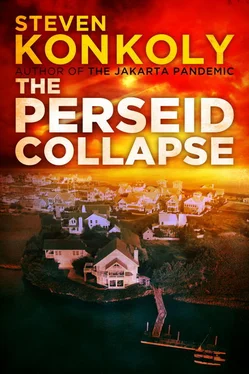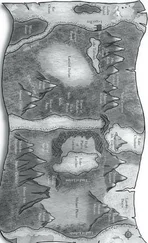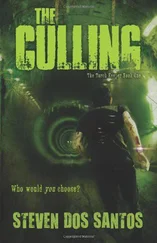“Mom made some sandwiches. Everyone needs to fuel up on some real food before we get to work this afternoon. We still have a long day ahead of us.”
“What’s happening out there? I mean, what is this?”
“Mr. Thornton got a broadcast on his satellite phone. They say that an asteroid broke up over the U.S. and hit the East Coast. I think we got lucky.”
“I don’t feel lucky,” Emily said, wiping her eyes and walking to the door.
“I do. I’ve got you and your mom safe. Ethan too. Once we get Ryan back, I’ll be the luckiest man on the planet,” he said, hugging her tightly.
“You’re the corniest dad on the planet. You said Mom made some real food? What’s the occasion?”
“Digging on your mom and dad in the face of the apocalypse?” said Alex.
“You know I love you, Dad. I’ll get Ethan and meet you downstairs,” she said and disappeared.
He glanced at the laundry basket, wondering if there was any way he could sneak the contents into one of the spare rucksacks and stash it in the Jeep. Not likely, but he might give it a try anyway. Alex ran into Ethan and Emily on the way out of her room.
“Tell your mother I’ll be right down.”
Once they had descended the stairs, he hurried into the bedroom and vanished into the darkness of the walk-in closet to change out of his putrid clothes into shorts and a T-shirt for now. His right arm ached as he lifted the shirt over his head. He’d have to tend to this injury immediately after lunch. Losing the effective use of his dominant arm would be a showstopper for Boston. He pushed the pain aside and finished changing. He reached for the bedroom door, but paused, thinking about what Charlie had said. He didn’t expect Chinese paratroopers to drop from the skies, but it couldn’t hurt to be ready for trouble.
Alex parted the shoulder-level curtain of clothing at the back of the closet and touched the keypad, illuminating the numbers. He’d felt confident that the keypad would function, but had the option of opening the gun safe manually with a hidden key if the electronics had succumbed to the EMP. Alex punched in the eight-digit code on the keypad mounted on the stand-up gun safe, and heard the mechanisms within the door shift.
He pulled on the handle, activating a small blue LED light within the safe, removed the HK P30 pistol sitting on the shelf above the rifles, and started to move it to his drop-down holster. He stopped, realizing that he’d have to thoroughly clean the holster first. The pistol could wait.
The rifle emerged next, along with a green polymer thirty-round .223 magazine. He inserted the magazine and rapidly pulled the charging handle, chambering a round. He placed the rifle against the side of the safe and took the MOLLE tactical chest rig from a hook on the back wall. He donned the rig over his clothes and filled the eight magazine pouches with spare rifle magazines from the top shelf of the safe, bringing his immediately available total to twenty magazines, or six hundred rounds. He may not have to dive for the additional .223 ammunition from the basement, which suited him fine.
He swapped out the two mud-encrusted pistol magazines from his holster rig and replaced them with clean polymer fifteen-round 9mm magazines from the safe. Three additional pistol magazines filled the smaller pouches on the left side of his modular chest rig. A total of six pistol magazines would be more than enough. Standing in his closet, he carried more ammunition than he’d fielded during combat operations in Iraq. Alex closed the safe and picked up the HK416 rifle.
Closely resembling the M4 carbine, the HK416 represented an improvement over the venerable M4 design, offering superior reliability and durability under all conditions. Extensive field-testing over the past decade consistently demonstrated the advantages of Heckler and Koch’s proprietary rifle system over the traditional variants of the M4, leading to its adoption by the United States Army and United States Marine Corps as their primary battle rifle. Alex had chosen to purchase and train with the civilian variant of the HK416 that most closely resembled the standard military-issued rifle.
Featuring a 16.5-inch heavy barrel, quad floating rails, vertical fore grip and telescoping stock, his rifle was nearly indistinguishable from its military counterpart. He had even opted to mount a Trijicon 4X Advanced Combat Optical Gunsight (ACOG) to the rifle, further mimicking standard marine issue. The Marine Corps had long ago equipped every rifle in their inventory with a variation of the ACOG sight, bucking the long-standing tradition of relying upon iron sights. Alex compromised by installing flip up iron sights on forty-five degree angle rail mounts, giving him the option of canting the rifle and using iron sights for close-in engagements.
A minute later, he ran into Kate at the bottom of the stairs, holding a plateful of sandwiches out to him.
“We’re already at this point?” she commented, nodding at his gear.
“We were there as soon as the EMP hit. Eating upstairs?”
“We could all use a break from the mud. The kids will bring the rest of the food up. I say we clean up and start over. Wash the day off while we still have running water. Lunch once everyone looks and smells human again,” said Kate, handing him the plate.
“Sounds like a plan.”
“I’ll grab one of the coolers from the garage. I put some beers and sodas in the freezer for now. I’ll dump the drinks and some ice in the cooler and meet you upstairs,” she said.
“Good. I could use a beer before swimming around the basement,” said Alex.
“You’re still planning on going down there?”
“Unfortunately, I don’t see any other option, unless you want to ride to Limerick with a shotgun.”
“No thanks. You still need a shower, by the way—not that I can smell you over myself.”
“The whole neighborhood is going to smell ten times worse in a few days. This crap isn’t going anywhere,” he said.
“Good thing we won’t be here.”
EVENT +09:57
Scarborough, Maine
Alex sat on the top stair and splashed his feet in the pitch-black water, desperately trying to convince himself that he didn’t need any of the equipment in the basement. He could think of twenty good reasons why he shouldn’t submerge himself in the darkness below, most of them safety related, some of them purely irrational. His overly active imagination had swept the worst sea creatures conceivable two miles inland with the tsunami, to be deposited through the basement window.
He wore a blue swimsuit, tight-fitting polyester running shirt, and swim fins. A diver’s mask and snorkel, which he’d taken from the boat and stashed in his rucksack, sat on his lap. He’d gotten lucky with that decision. Since the Maine coast wasn’t exactly renowned for its crystal-clear waters, the rest of their snorkeling gear was in the basement, where it waited for a trip to Florida or the Caribbean. They’d always carried at least one snorkeling kit onboard the sailboat for practical reasons. Over the past five years, he’d gone over the side more times than he could count to clean seaweed from the propeller or disentangle a lobster pot line from the rudder.
His biggest fear was the electricity. What if the grid was restored while he was submerged? He knew this wouldn’t happen, but the thought dogged him. The waterline was well above the breaker box, exposed directly to the house’s external utility feed. He pushed this thought as far away as possible, focusing on the more immediate, tangible challenges he’d face underwater. Breathing always came in at the top of his mental list.
From what he could tell, the water pushed up against the basement ceiling. He might find a pocket of air between ceiling joists if the water level was a few inches below the floorboard, but the air would be limited. Using the snorkel to access the air presented a few risks. With only a few inches of dry space, he would have to be extremely careful not to tip the snorkel and inhale water. Low on air deep inside the basement, a panicked moment could kill him. This assumed he could find a few pockets of air. If not, he’d have to take the entire operation slowly, making multiple trips to unlock doors, safes, clear debris—all culminating in a few long, unobstructed trips to haul out his perceived bounty. Fortunately, everything he needed was clearly labeled and conveniently located in one place inside the “bunker.”
Читать дальше












